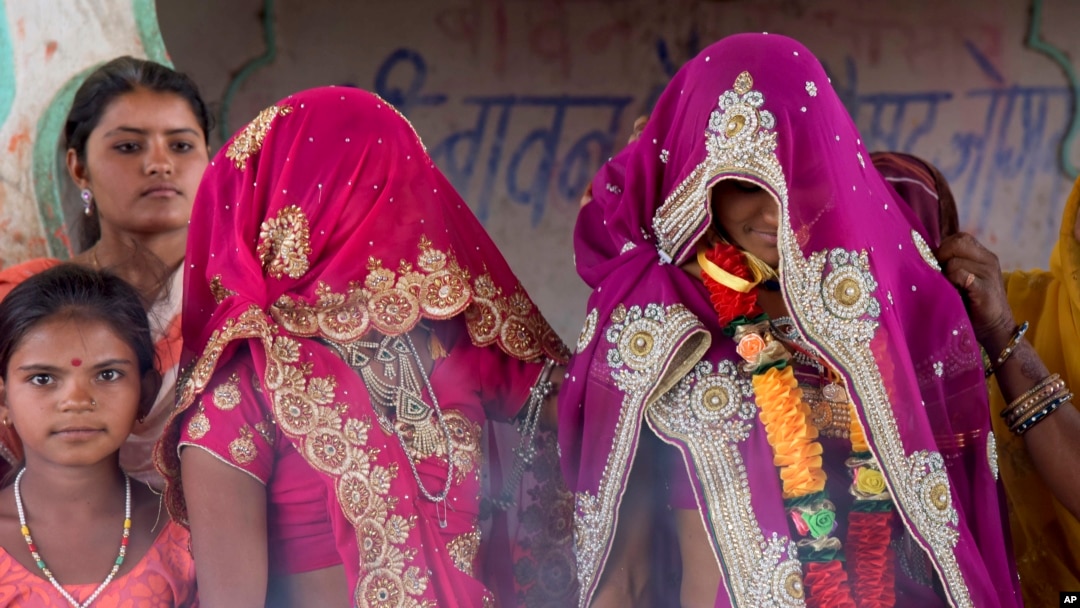Prachi Chauhan is one of hundreds of girls who has joined a campaign in India’s northern state of Haryana to raise the legal age of marriage for women from 18 to 21 years old.
The 17-year-old high school student wants to go to college next year and continue her education, but her parents are under pressure from the community to get her married. “People came and said that your daughter is about to turn 18, ‘you should find a suitable match for her because it is not right to have an unmarried young girl at home,’” Chauhan told VOA.

Prachi Chauhan is one of the hundreds of girls who has joined a campaign to raise the minimum marriage age of girls from 18 to 21.
In one of India’s most conservative states, where patriarchal norms prevail, the feisty girl is one of the luckier ones because her parents respected her wishes. “I put my foot down and refused to meet the boys,” said Chauhan. “You have to stand up for yourself and fight for what you want because nobody will come to take care of you when things go wrong.”
Most girls in her village, Abhaypur, get married when they are 18 years old.
Activists and girls spearheading the campaign to raise the marriage age for women say changing the law will help more girls convince their parents to allow them to pursue higher education and become financially independent.
The campaign picked up momentum after Prime Minister Narendra Modi promised to review the legal age of marriage in his Independence Day address last year. The government had earlier set up a task force to carry out the review.
Raising the age of marriage would “give women increased access to economic independence, greater freedom of marital choice,” India’s health ministry had said in a statement soon after the announcement. It would also lead to more women joining the workforce and be “a boon for maternal and child health,” it added.
However, a year later, there is no official word on the panel's recommendations.
Not all are on board with the proposal — they say while getting married at a higher age is preferable, mandating it legally is not the solution to problems faced by girls in India.
“There are a lot of other reasons at play for getting girls married off at an early age. Dowry is one of them — lesser dowry is paid for younger women so a lot of poor families marry their daughters when younger,” said Mary John, the director at the Centre for Women’s Development Studies in New Delhi, a research and advocacy organization. “One cannot use age as a legal fix for a set of problems that don’t lend themselves to that kind of fix.”
She also expresses concerns that raising the legal age would criminalize marriages of girls below 21. “How will that be helpful?” John said.
But, convinced that a law will help them fend off societal and parental pressure, hundreds of girls in Haryana are pressing ahead with their campaign — in recent months many wrote letters to Prime Minister Modi urging him to increase the marriage age for girls to 21, bringing it on par with men.
Some of them come from districts where patriarchal norms leave little room for women to make their own decisions and where many have seen lives upended by early marriages.
Among them is Tabasum Muskan, a resident of Mewat, a district in Haryana state, which ranks the lowest in all developmental indices in the country.
“I am not going to get married ‘til I finish my education and I will also ensure that none of the girls in my family get married before completing their graduation,” she vowed.
Muskan became determined after her sister, who was married off when she turned 18, returned to her parent’s home with a child after the marriage fell apart. Not equipped with career skills, she has no way to support herself.
According to a survey by the Ministry of Health and Family Welfare, only 9% of married women in Mewat have more than 10 years of schooling.
Sunil Jaglan, who has led several campaigns related to women’s empowerment over the last decade, has founded a voluntary group led by girls called Lado Panchayat (girls council) that is helping the campaign raise the minimum age of marriage for girls.
A meeting of "Lado Panchayat", or Girls Council, a voluntary group that is helming the campaign to raise the minimum age of marriage for girls.
Lado Panchayat was formed to counter a decades-old system of unelected village councils in Haryana known as “Khap” panchayats, which traditionally have only male representatives. Carrying significant social influence, they have been blamed for passing several regressive orders in recent years in some places such as banning girls from wearing jeans.
“The majority of the women with whom I interacted felt that 18 years is too early for a girl to get married,” Jaglan said. “What we have seen is that in most cases a girl gets pregnant in a few months of marriage. At 18 years she is often not mentally or physically ready to bear children. As a result, her health deteriorates,” he said.
He feels that women should get the same opportunity as men to complete their education.
The girls campaigning for raising the minimum age of marriage say it could be life-altering for them.
Priyakshi Jakhar, a postgraduate student and a member of Lado Panchayat, has helped raise awareness on this issue during the last few months. “At 18 years, a girl has barely finished school. Raising the minimum age will enable her to be stronger mentally and physically and give her time to get equipped for a career,” she said.
Suhasini Sood contributed to this story.


